After our first impressions of the iQOO Neo 7 Pro, we were certain that the smartphone definitely has something to offer that its competitors don’t, and after our full review, we are building further on that thought. With over two weeks of use, we are now ready with the review of the iQOO Neo 7 Pro and can definitely tell you if it is worth its starting price of Rs 34,999.
Design & Build Quality

iQOO is one of those brands that does believe in cutting costs but in the right manner and the one that doesn’t affect your daily usage. With the Neo 7 Pro, it’s no different if we talk of build quality and design. Yes, it has a plastic frame, but the back is frosted glass with a matte finish, and it couldn’t have felt more premium.
If anything, the plastic does help in maintaining a tight grip as the back is highly slippery, at least in the blue shade we got. Fortunately, iQOO provides a case in the box, so you don’t have to worry about slipperiness. The orange variant shouldn’t have this issue as it has a leather texture. The buttons are on the right, with the power button having a different texture which is impressive.

The back has the same design as the Neo 7 and it stands out from the crowd. It has created its own identity, which sets it apart from other mid-rangers. The curved back panel further elevates the in-hand feel while there’s a glittery shine when the light falls on it.
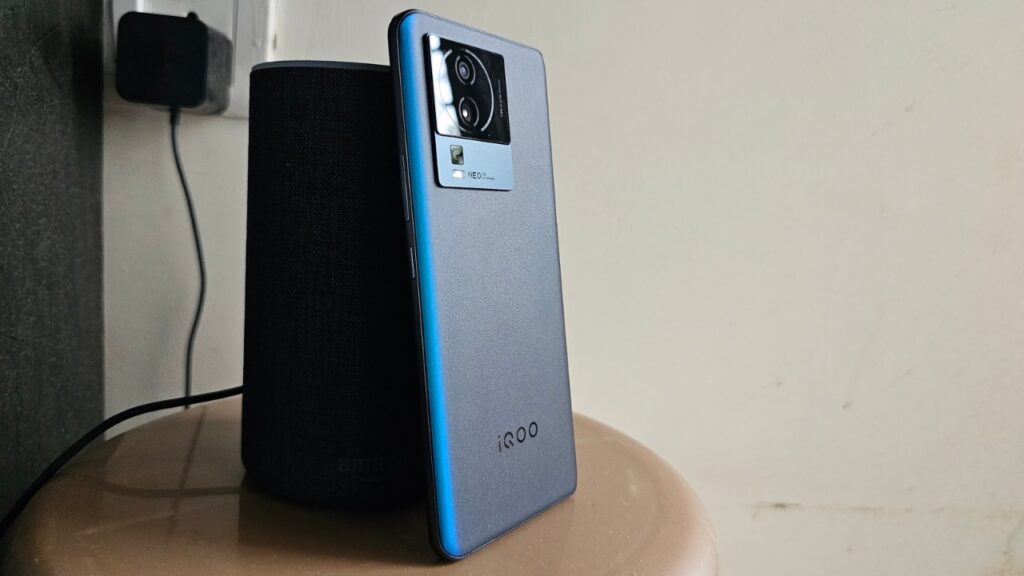
The storm blue variant has a blue and black gradient shade at the back, where the left starts from blue and slowly blends into the black to the right, making it one of the most unique colours I have seen on a smartphone.
There’s a stereo speaker setup which sounds good. It has some amount of bass, and the lyrics and loudness is handled fine. The Haptics are also some of the best in their price range, being strong and precise.
Display
The iQOO Neo 7 Pro sports a 6.78-inch E5 AMOLED Display with an FHD+ (1080 x 2400 pixels) resolution, HDR10+ support, up to 1500 nits brightness and a 120Hz refresh rate.

Once again, iQOO doesn’t disappoint as the panel creates vivid colours, is sharp and gets impressively bright under direct sunlight. The viewing angles are great, and watching content on this display is a treat. The blacks are deep enough, while the bezels aren’t too big either.
The panel also doesn’t break a sweat while maintaining a 120Hz refresh rate. There’s no rainbow effect as well, which I have noticed on a few iQOO phones in the past. Also, iQOO gives you a pre-applied screen protector which is good to know.
Performance & Software
The Neo 7 Pro is powered by the Snapdragon 8+ Gen 1 SoC paired with up to 12GB LPDDR5 RAM and up to 256GB UFS 3.1 inbuilt storage. There will also be a vapour chamber cooling system for heat dissipation on both models. At its price, iQOO is competing with the OnePlus 11R and even the latest Reno 10 Pro+ considering all of them have the same Chipset under the hood.
We got the top-end variant and we are happy to report that iQOO Neo 7 Pro doesn’t want to slow down one bit and is giving its competitors a run for their money.
It can handle everything you throw at it, from the most CPU-demanding tasks to the most graphic-heavy games. RAM management is excellent as well. Most of my apps remained in memory for prolonged periods and the device picked up majority of the apps wherever I left them last.
Coming to the software, the iQOO handset runs on FunTouchOS 13 based on Android 13. While it certainly doesn’t match the likes of OneUI or OxygenOS in terms of features or polishness, it does get the job done. We did have a few bugs in the beginning but an update that came in solved most of them. The device comes with the June security patch out of the box and that’s good. However, the only major disappointment here is that you will be getting major OS upgrades until Android 15 and another year of security patches, compared to 3 years of OS upgrades on the competition, such as the OnePlus 11R.
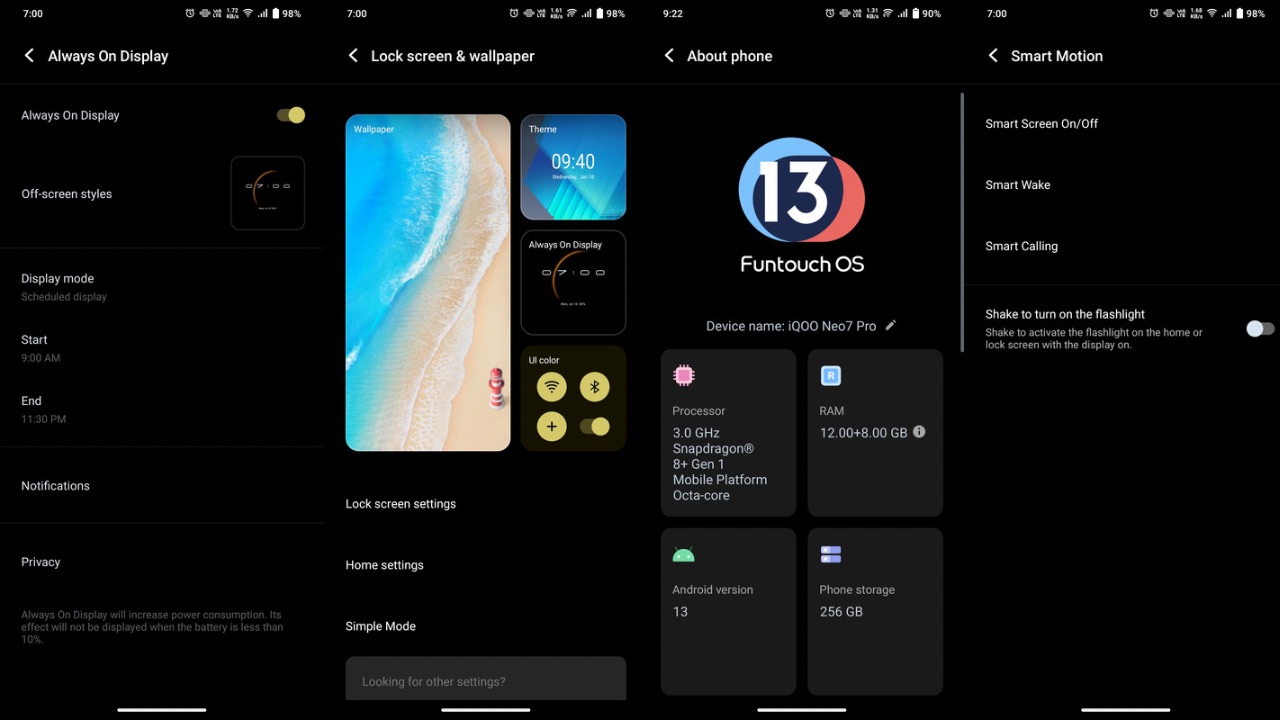
It gets its own set of unique features, such as changing the system animation styles. One can also change the UI colour based on the wallpaper, and it works well. A theme store is also available for choosing various lock screens, fonts, etc.
There are new Always-on display styles also, where some look decent but some are too gaudy or cartoonish. For security you get both fingerprint and face recognition, both of which work impressively. iQOO also gives support for App lock and hidden apps as well.
As for gaming, we already know that the Snapdragon 8+ Gen 1 is a very capable chip for all sorts of tasks and that shows here also. During our review of the iQOO Neo 7 Pro, most of the games, including Farlight 84, Call of Duty Mobile, RL sideswipe, etc maintain their highest frame rate without any lags.
There’s also an Ultra-game mode that apparently improves gaming performance, and includes additional features like 4D game vibration, frame rate priority, and more. There’s also a game display enhancement feature enabled by an intelligent display chip, which boosts colours and overall image quality. We did find a difference in colours and quality when this feature was enabled so it’s a nice addition.
Connectivity performance included Wi-Fi, Bluetooth, and 5G network remained optimum.
Battery Backup
The smartphone is backed by a 5000mAh battery with 120W Fast charging support. Combined with one of the most efficient chipsets out there, the iQOO Neo 7 Pro goes on and on. You can get it last two days easily with light usage and even with heavy use, it can easily go on a day without you needing to plug it in.

It can give you about 6 to 7 hours of screen-on time or even more, based on your use. With my usage, which included browsing the internet, scrolling through social media apps, calling, some gaming and chatting, I could get close to 6.5 hours of screen-on time and around two days of use which is phenomenal.
Further, a 120W fast charger is included in the box and it charged the handset from 0 to 100 within half an hour during our review period of the iQOO Neo 7 Pro, which is again exceptional.
Cameras

The handset packs a triple rear camera setup including a 50-megapixel f/1.88 Samsung GN5 primary sensor, an 8MP f/2.2 ultra-wide angle sensor and a 2-megapixel f/2.4 macro sensor. It further features a 16-megapixel f/2.45 camera on the front.

The 50MP Samsung sensor has been tuned well on the iQOO Neo 7 Pro. It clicks quite impressive shots with natural colours and good dynamic range. There’s more than enough sharpness in the photo with a great amount of detailing. The exposure levels are also in control and there’s no noise in the photos. The shutter lag is also well contained.
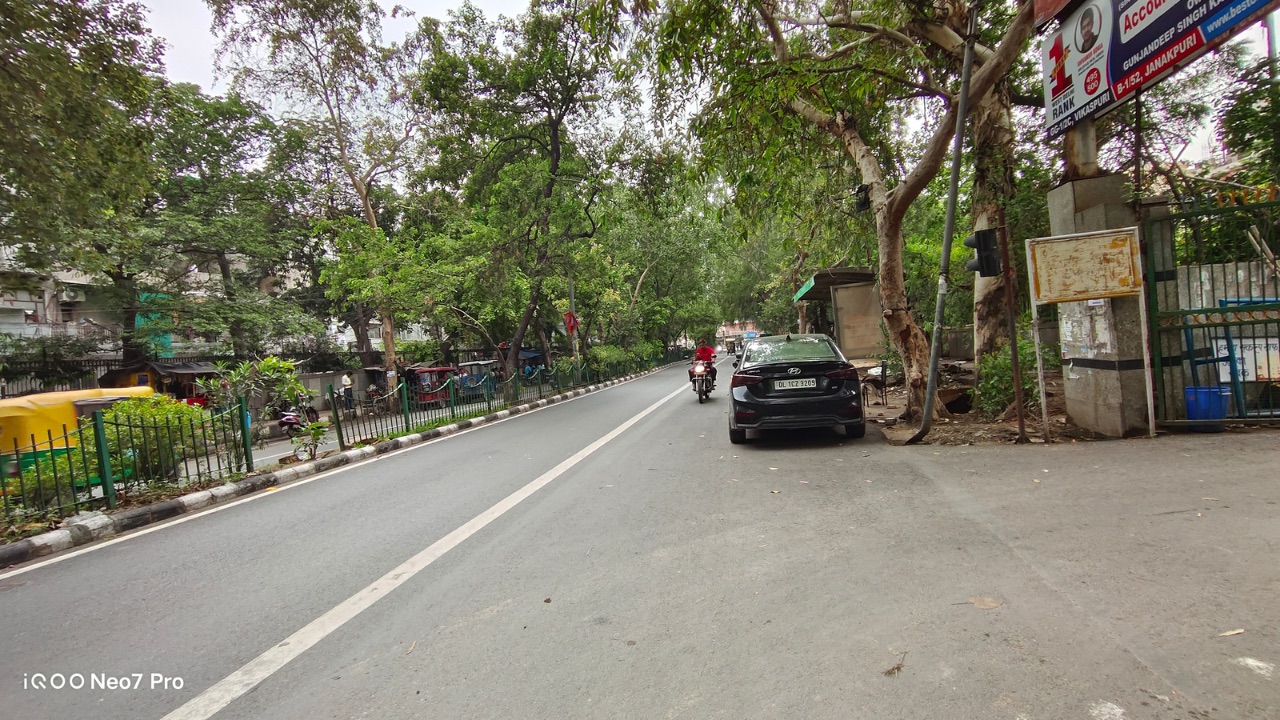
The 8MP ultra-wide sensor clicks photos which have a slightly warmer tone when compared to the photos from the primary sensor. The detailing is okay but the photos do distort at the edges and the sharpness and details go for a toss, therefore giving it a weird look.

As for the portraits, these are some of the best shots I have seen in a while from a smartphone in this price range, but only when you can click it right. The portrait shots have amazing details, colours and sharpness but the main problem arises when it fails to identify the subject properly and EDGE detection goes down instantly in terms of quality.
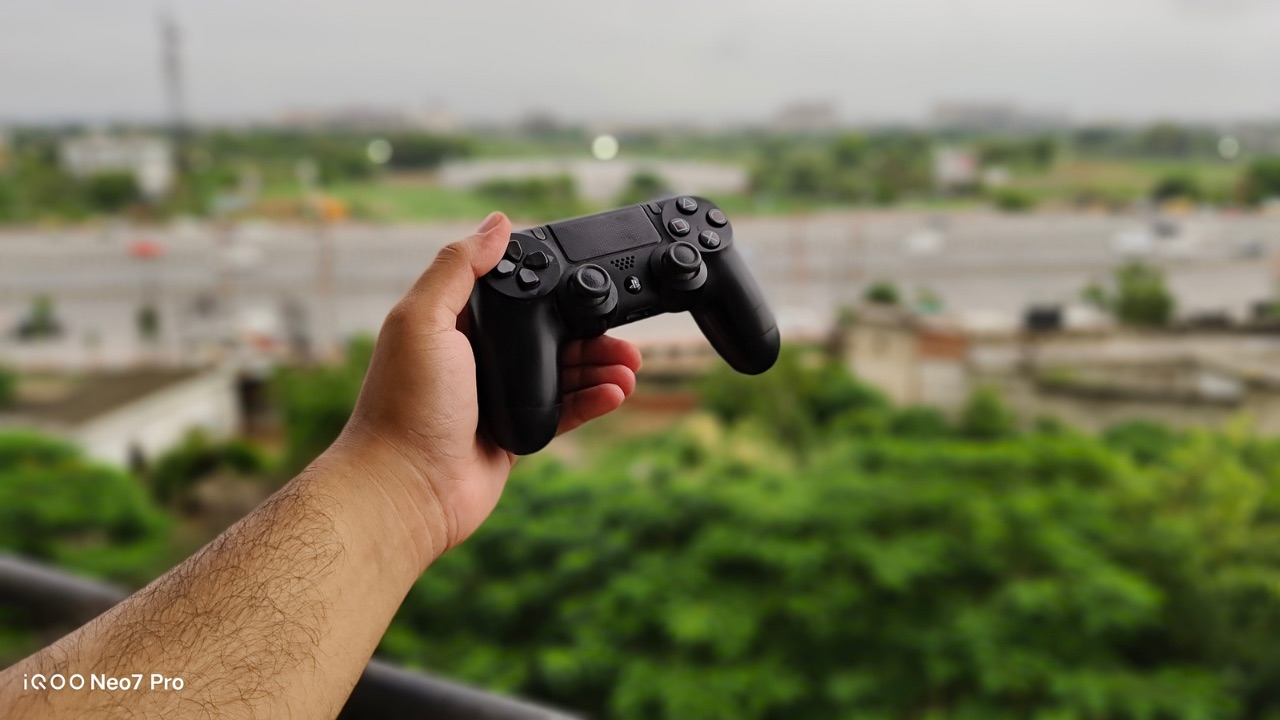
The edges of the subject are often blurred out in 1x photos while 2x photos are slightly better. In the photos above, you can observe how the top edges of the controller are blurred out. However, the bokeh effect actually looks really natural.

Night shots are above average at best. They lack proper colours and details and turning on Night mode does help but very little. It makes the image slightly clearer with better exposure control.

The selfies are decent with acceptable detailing and handling of skin tones. In fact, the selfie portraits have better edge detection than portraits from the rear sensor.

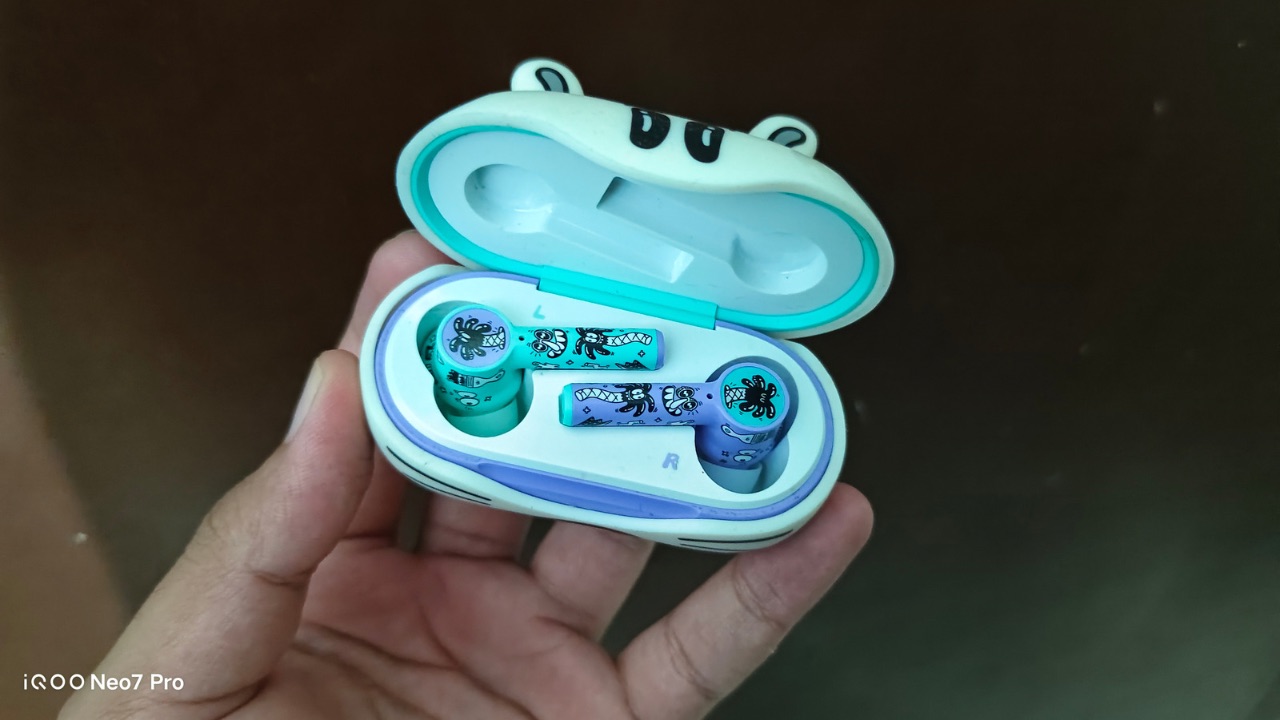
As for shots under artificial lighting, they look more than decent with ample sharpness and natural colour shades. Shots under low lighting do look a little smudgy with an overly cool tone.
Overall, this is a much better camera setup than what I saw on the iQOO Neo 7. iQOO has made some considerable improvements not only in terms of quality, but especially when it comes to tuning it the right way.



